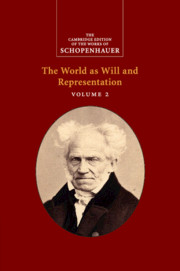Chapter 30 - On the Pure Subject of Cognition
Published online by Cambridge University Press: 30 June 2022
Summary
We can grasp an Idea, it can enter our consciousness, only by means of an alteration within us, an alteration that could be viewed as an act of selfdenial to the extent that it consists of cognition turning entirely away from its own will, completely losing sight of the precious charge that had been entrusted to it, and regarding things as if they could never have anything to do with the will. This is the only way that cognition could become a pure mirror of the objective essence of things. Cognition that is conditioned in this way must lie at the basis of every true work of art as its origin. The requisite alteration in the subject cannot proceed from the will precisely because it consists of the elimination of all willing and thus cannot be an act of free choice, i.e. it cannot be up to us. Instead, it can come only from a temporary preponderance of intellect over the will, or, viewed physiologically, from a strong excitation of the intuitive activity of the brain in the absence of any excitation of the inclinations or affects. To make this more clear, we might recall that our consciousness has two sides: it is in part consciousness of one's own self, which is the will; in part it is consciousness of other things, and as such it is chiefly an intuitive cognition of the external world, a grasp of objects. But the more that one side of consciousness comes to the fore, the further the other recedes. Accordingly, consciousness of other things, that is, intuitive cognition, becomes more complete, i.e. more objective, the less we are conscious of our own self in the process. There is a real antagonism here. The more we are conscious of the object, the less we are of the subject; on the other hand, the more consciousness is absorbed in the subject, the weaker and more incomplete is our intuition of the external world. Some of the conditions necessary for pure objectivity in intuition are permanent, such as the perfection of the brain and the overall physiological constitution conducive to its activity; and some are temporary, to the extent that they are made possible by everything that enhances the tension and receptivity of the cerebral nervous system without exciting any passion.
- Type
- Chapter
- Information
- Schopenhauer: The World as Will and Representation , pp. 384 - 392Publisher: Cambridge University PressPrint publication year: 2018

